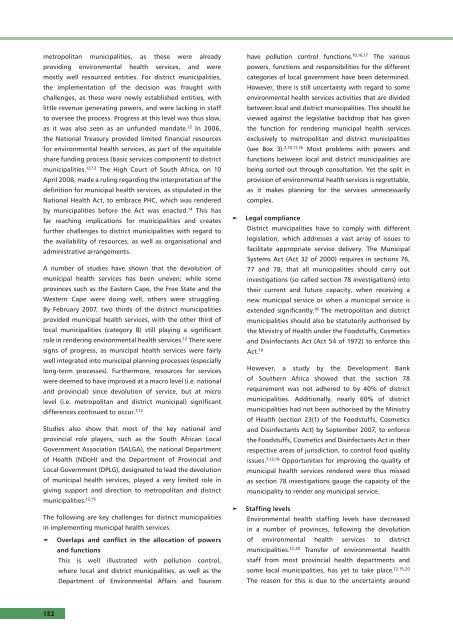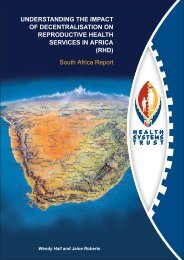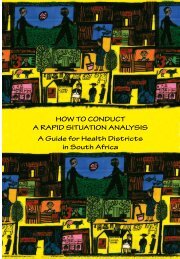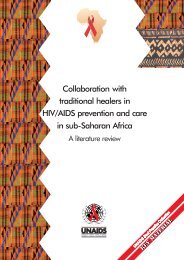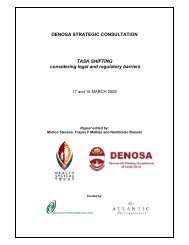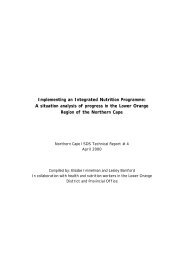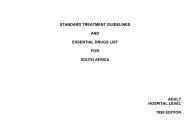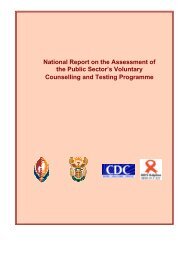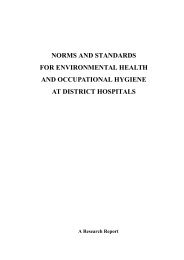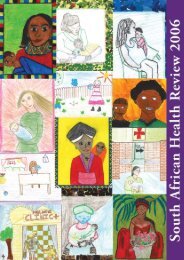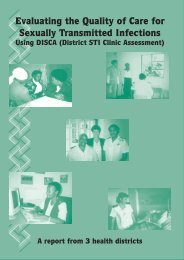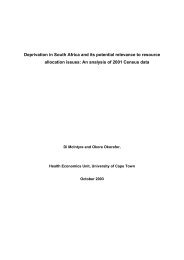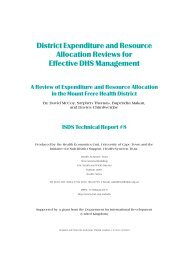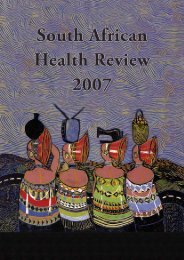South African Health Review 2008 - Health Systems Trust
South African Health Review 2008 - Health Systems Trust
South African Health Review 2008 - Health Systems Trust
Create successful ePaper yourself
Turn your PDF publications into a flip-book with our unique Google optimized e-Paper software.
metropolitan municipalities, as these were already<br />
providing environmental health services, and were<br />
mostly well resourced entities. For district municipalities,<br />
the implementation of the decision was fraught with<br />
challenges, as these were newly established entities, with<br />
little revenue generating powers, and were lacking in staff<br />
to oversee the process. Progress at this level was thus slow,<br />
as it was also seen as an unfunded mandate. 12 In 2006,<br />
the National Treasury provided limited financial resources<br />
for environmental health services, as part of the equitable<br />
share funding process (basic services component) to district<br />
municipalities. 12,13 The High Court of <strong>South</strong> Africa, on 10<br />
April <strong>2008</strong>, made a ruling regarding the interpretation of the<br />
definition for municipal health services, as stipulated in the<br />
National <strong>Health</strong> Act, to embrace PHC, which was rendered<br />
by municipalities before the Act was enacted. 14 This has<br />
far reaching implications for municipalities and creates<br />
further challenges to district municipalities with regard to<br />
the availability of resources, as well as organisational and<br />
administrative arrangements.<br />
A number of studies have shown that the devolution of<br />
municipal health services has been uneven; while some<br />
provinces such as the Eastern Cape, the Free State and the<br />
Western Cape were doing well, others were struggling.<br />
By February 2007, two thirds of the district municipalities<br />
provided municipal health services, with the other third of<br />
local municipalities (category B) still playing a significant<br />
role in rendering environmental health services. 12 There were<br />
signs of progress, as municipal health services were fairly<br />
well integrated into municipal planning processes (especially<br />
long-term processes). Furthermore, resources for services<br />
were deemed to have improved at a macro level (i.e. national<br />
and provincial) since devolution of service, but at micro<br />
level (i.e. metropolitan and district municipal) significant<br />
differences continued to occur. 7,12<br />
Studies also show that most of the key national and<br />
provincial role players, such as the <strong>South</strong> <strong>African</strong> Local<br />
Government Association (SALGA), the national Department<br />
of <strong>Health</strong> (NDoH) and the Department of Provincial and<br />
Local Government (DPLG), designated to lead the devolution<br />
of municipal health services, played a very limited role in<br />
giving support and direction to metropolitan and district<br />
municipalities. 12,15<br />
The following are key challenges for district municipalities<br />
in implementing municipal health services.<br />
Overlaps and conflict in the allocation of powers<br />
and functions<br />
This is well illustrated with pollution control,<br />
where local and district municipalities, as well as the<br />
Department of Environmental Affairs and Tourism<br />
<br />
<br />
have pollution control functions. 10,16,17 The various<br />
powers, functions and responsibilities for the different<br />
categories of local government have been determined.<br />
However, there is still uncertainty with regard to some<br />
environmental health services activities that are divided<br />
between local and district municipalities. This should be<br />
viewed against the legislative backdrop that has given<br />
the function for rendering municipal health services<br />
exclusively to metropolitan and district municipalities<br />
(see Box 3). 2,10,11,16 Most problems with powers and<br />
functions between local and district municipalities are<br />
being sorted out through consultation. Yet the split in<br />
provision of environmental health services is regrettable,<br />
as it makes planning for the services unnecessarily<br />
complex.<br />
Legal compliance<br />
District municipalities have to comply with different<br />
legislation, which addresses a vast array of issues to<br />
facilitate appropriate service delivery. The Municipal<br />
<strong>Systems</strong> Act (Act 32 of 2000) requires in sections 76,<br />
77 and 78, that all municipalities should carry out<br />
investigations (so called section 78 investigations) into<br />
their current and future capacity, when receiving a<br />
new municipal service or when a municipal service is<br />
extended significantly. 18 The metropolitan and district<br />
municipalities should also be statutorily authorised by<br />
the Ministry of <strong>Health</strong> under the Foodstuffs, Cosmetics<br />
and Disinfectants Act (Act 54 of 1972) to enforce this<br />
Act. 19<br />
However, a study by the Development Bank<br />
of <strong>South</strong>ern Africa showed that the section 78<br />
requirement was not adhered to by 40% of district<br />
municipalities. Additionally, nearly 60% of district<br />
municipalities had not been authorised by the Ministry<br />
of <strong>Health</strong> (section 23(1) of the Foodstuffs, Cosmetics<br />
and Disinfectants Act) by September 2007, to enforce<br />
the Foodstuffs, Cosmetics and Disinfectants Act in their<br />
respective areas of jurisdiction, to control food quality<br />
issues. 7,12,19 Opportunities for improving the quality of<br />
municipal health services rendered were thus missed<br />
as section 78 investigations gauge the capacity of the<br />
municipality to render any municipal service.<br />
Staffing levels<br />
Environmental health staffing levels have decreased<br />
in a number of provinces, following the devolution<br />
of environmental health services to district<br />
municipalities. 12,20 Transfer of environmental health<br />
staff from most provincial health departments and<br />
some local municipalities, has yet to take place. 12,15,20<br />
The reason for this is due to the uncertainty around<br />
152


